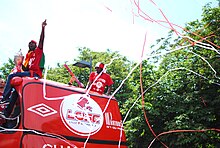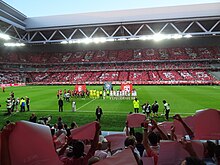Lille OSC
| File:Lille OSC 2018 logo.png | ||||
| Full name | Lille Olympique Sporting Club | |||
|---|---|---|---|---|
| Nickname(s) | Les Dogues (The Great Danes) | |||
| Short name | LOSC | |||
| Founded | 23 September 1944 | |||
| Ground | Stade Pierre-Mauroy | |||
| Capacity | 50,186 | |||
| Chairman | Gérard López | |||
| Manager | Christophe Galtier | |||
| League | Ligue 1 | |||
| 2017–18 | Ligue 1, 17th | |||
| Website | http://www.losc.fr/ | |||
|
| ||||
LOSC Lille (Lille Olympique Sporting Club, French pronunciation: [lil ɔlɛ̃pik]; commonly referred to as Le LOSC, Lille OSC or simply Lille) is a French association football club based in Lille. The club was founded in 1944 as a result of a merger and play in Ligue 1, the first division of French football. Lille has played its home matches since 2012 at Stade Pierre-Mauroy in nearby Villeneuve d'Ascq, which replaced the club's previous home of Stade Lille-Metropole in the same community.
Lille was founded as a result of a between Olympique Lillois and SC Fives. Both clubs were founding members of the French Division 1 and Lillois was the league's inaugural champions. Under the Lille emblem, the club has won three league titles in 1946, 1954, and 2011 and six Coupe de France titles, which is tied for fourth-best among clubs. Lille and Red Star F.C. are the only French clubs in the competition's history to win the Coupe de France in three consecutive seasons. Lille's most successful period was the decade from 1946 to 1956 when the team was led by managers George Berry and André Cheuva.[1][2]
Lille have a long-standing rivalry with its neighbours RC Lens. The two clubs regularly contest the Derby du Nord. Lille is presided over by Gérard Lopez, an entrepreneur-investor and an active Luxembourgish-Spanish businessman who invests in the sports industry.
History
1944–1955: The first decade
Before the Second World War, the city of Lille had two clubs in Ligue 1; Olympique Lillois and Sporting Club Fivois. Weakened by the war, the two clubs decided to merge in the autumn of 1944, giving birth to Lille Olympique Sporting Club (LOSC). Within its first decade of existence, the new club won two league titles and reached the second place for four consecutive seasons. In the Coupe de France the club accumulated five wins in seven finals, including five successive finals. The final of the Latin Cup was also reached.
1956–1980: Lille loses the way
Lille was relegated for the first time in 1956. The club became a mid-table side and in the late 1960s, after a long period of anonymity, and weighed down by a lack of facilities and resources, Lille abandoned its professional status. It was feared that the club might disappear. However, some young leaders, such as Max Pommerolle, came and gave new impetus to the club. Nevertheless, the results remained erratic and the only titles that ignited the fans' passions were won in the Second Division.
1980–2000: Laying the foundations for future success
In July 1980, Lille was the first French club to opt for the status of a Mixed Economy Company, of which the city of Lille became the majority shareholder. The team of presidents Amyot, Deschot and Dewailly all struggled to compete with the top teams in the country. Jacques Amyot's resignation in 1990 led to three more difficult years for the club which compromised its very existence. It took Bernard Lecomte's arrival in 1993 to set the club finances on the road to recovery. After a final relegation in 1997, the team trained by Bosnian coach Vahid Halilhodžić was soon promoted back to the elite, in the same year the French Football League was privatised.
2000–present: A steady climb to the top

In just its first season back in the top flight 2000–01 French Division 1, Lille qualified for Europe for the first time in the club's history, booking its place in the 2000–01 Champions League. On the back of the club's new status, Lille entered into a decisive new era under the guidance of chairman and Chief executive officer Michel Seydoux and coach Claude Puel. The club left the historical Stade Grimonprez-Jooris to join the Stadium Lille Métropole and became a regular on the European scene. Amongst its most emphatic results was the 1–0 victory over Manchester United at the Stade de France in 2005, the 2–0 triumph over Milan in San Siro in 2006 and the 1–0 home win over Liverpool in 2010. A steady development off the pitch (inauguration of the Domaine de Luchin training complex in 2007, opening of the Grand Stade in 2012), coupled with the sporting progression under the expert hand of coach Rudi Garcia, took Lille back to the summit of the French game with the League and Cup double in 2011 (56 years after the club's last trophy). In 2012, LOSC confirmed its place at the top table of the domestic game with another qualification for Europe's most prestigious club competition, the Champions League in 2012–13. With the club finishing just outside the UCL places that season, Garcia left to join Roma, while former Montpellier coach René Girard was appointed the new Lille manager.[3] After two years in charge of the club, Girard left his role as the head coach by mutual consent. He was joined by assistants Gerard Bernadet and Nicolas Girard in making the exit. In May 2015, the Ivory Coast national team head coach Hervé Renard was appointed as the new manager. On 11 November 2015, Renard was terminated as manager and was replaced by Frederic Antonetti.[4][5] On 23 November 2016 a year after being appointed, Lille terminated Antonetti's contract with the club lying second last in the table.[6] In March 2017, Lille appointed Marcelo Bielsa as new manager of the club. In November 2017, Bielsa was suspended by Lille following an unauthorized trip to Chile with the club lying second from bottom on the table again and only managing 3 wins from the first 14 games of the season.[7][8].
On December 23 2017, Bielsa was terminated by Lille and replaced with former Saint-Etienne manager Christophe Galtier.[9] After a difficult 2017/2018 season, Lille managed to avoid relegation to Ligue 2 by defeating Toulouse 3-2 in the second last game of the campaign.[10]
Stadiums

Stade Pierre-Mauroy was inaugurated in 2012. Originally named the Centre Olympique de Lille Est, the club's sporting venue is spread over five hectares and features three natural grass football pitches and one synthetic pitch, as well as a number of buildings including a medical centre and gymnasium. These attributes had seen the club house part of the LOSC Youth Academy here, before all the club's operations were moved to the Domaine de Luchin in Camphin-en-Pé.[11]
Club rivalries
The Derby du Nord is a football match contested between Lille and RC Lens. The derby name refers only to their geographical location in France since Lille is the only club of the two actually situated in the department of Nord. Lens are situated in the western department of Pas-de-Calais. The name can also refer to matches involving Lille and Valenciennes as both clubs are located within Nord, however, the match historically refers to matches involving Lille and Lens. As a result, the Lille–Valenciennes match is sometimes referred to as Le Petit Derby du Nord. The two clubs first met in 1937 when Lille were playing under the Olympique Lillois emblem. Due to each club's close proximity towards each other being separated by only 40 kilometres (25 mi) and sociological differences between each club's supporters, a fierce rivalry developed. The Derby du Nord is underpinned by social and economic differences, since the city of Lens is known as an old, working-class, industrial city and Lille as a middle-class, modern, internationally oriented one. Nowadays the matches, which can spark intense feelings on both sides, have gained prominence as they may determine berths in continental competitions.
Players
Current squad
- As of 31 August 2018.[12]
Note: Flags indicate national team as defined under FIFA eligibility rules. Players may hold more than one non-FIFA nationality.
|
|
Players under contract
Note: Flags indicate national team as defined under FIFA eligibility rules. Players may hold more than one non-FIFA nationality.
|
Out on loan
Note: Flags indicate national team as defined under FIFA eligibility rules. Players may hold more than one non-FIFA nationality.
|
|
Reserve team
Note: Flags indicate national team as defined under FIFA eligibility rules. Players may hold more than one non-FIFA nationality.
|
|
Records
Most appearances
| # | Name | Matches |
|---|---|---|
| 1° | 428 | |
| 2° | 365 | |
| 3° | 313 | |
| 4° | 301 | |
| 5° | 292 |
Top scorers
| # | Name | Goals |
|---|---|---|
| 1° | 218 | |
| 2° | 135 | |
| 3° | 96 | |
| 4° | 81 | |
| 5° | 81 |
Management and staff
Lille Olympique Sporting Club – LOSC Lille (SASP) [13]
- President: Gérard Lopez
- Deputy CEO: Marc Ingla
- Academy Director: Jean-Michel Van Damme
- Football Director: Franck Béria
- Scouting Football Adviser: Luis Campos
- Manager: Christophe Galtier
Managerial history
Former coaches include Georges Heylens (1984–89), a former Belgian international player, Jacques Santini (1989–92), who managed the France national team between 2002 and 2004, Bruno Metsu (1992–93), who managed the Senegal national team at the 2002 World Cup, Pierre Mankowski (1993–94), who was formerly the assistant coach of the France national team and Vahid Halilhodžić (1998–02), who can be credited with the club's revival in the late nineties. Rudi Garcia, who played for Lille from 1980 to 1988, replaced Claude Puel at the beginning of the 2008 season. Puel had been with Lille since 2002. Thanks to his successes with the club, Puel had been approached by Portuguese club Porto to replace José Mourinho and league rivals Lyon to replace Alain Perrin; he finally decided to join Lyon after six seasons at the club.
|
|
|
Honours
Domestic
- Ligue 1
- Ligue 2
- Coupe de France
- Coupe de la Ligue
- Runners-up (1): 2015–16
- Coupe Gambardella
- Champions (1): 1960
- Runners-up (2): 1955, 2000
- Coupe Charles Drago
- Runners-up (2): 1954, 1956
Europe
- UEFA Intertoto Cup
- Winner (1): 2004
- Latin Cup
- Runners-up (1): 1951
References
- ^ [1]
- ^ "Lille seal historic title". ESPN Soccernet. 21 May 2011. Retrieved 24 May 2011.
- ^ http://www1.skysports.com/football/news/11813/8777137/Ligue-1-Lille-confirm-appointment-of-Rene-Girard-as-their-new-coach
- ^ http://www.goal.com/en-gb/news/3274/ligue-1/2015/11/11/17222252/lille-sack-manager-renard
- ^ http://www.goal.com/en-gh/news/4349/main/2015/11/23/17606742/lille-appoint-antonetti-as-their-new-manager
- ^ https://www.fourfourtwo.com/news/second-bottom-lille-sack-antonetti
- ^ http://www.dailymail.co.uk/sport/football/article-5125493/Lille-sack-Marcelo-Bielsa-six-months-charge.html
- ^ https://www.theguardian.com/football/2017/nov/30/marcelo-bielsas-short-lived-catastrophe-at-lille-is-coming-to-an-end
- ^ https://www.getfootballnewsfrance.com/2017/christophe-galtier-to-take-over-from-marcelo-bielsa-as-lille-manager/
- ^ https://www.theguardian.com/football/2018/may/14/lille-relegation-ligue-1-monaco-psg-strasbourg-lyon
- ^ "Archived copy". Archived from the original on 25 July 2013. Retrieved 25 July 2013.
{{cite web}}: Unknown parameter|deadurl=ignored (|url-status=suggested) (help)CS1 maint: archived copy as title (link) - ^ "Lille – season 2018/19" (in French). Lille OSC.
- ^ "LOSC Lille Métropole SASP" (in French). Lille OSC. Retrieved 31 December 2010.
- ^ "France – Trainers of First and Second Division Clubs". RSSSF. Archived from the original on 31 May 2008. Retrieved 31 December 2010.
{{cite news}}: Unknown parameter|deadurl=ignored (|url-status=suggested) (help)

